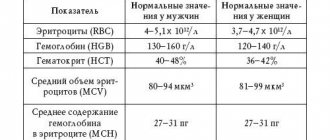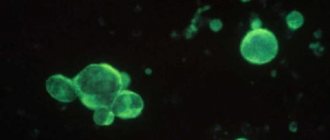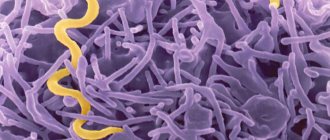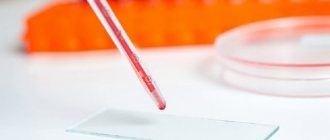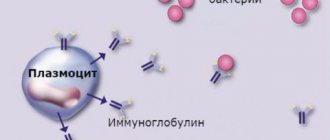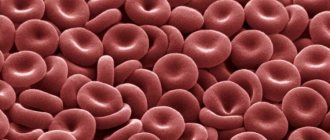© Author: Sazykina Oksana Yuryevna, general practitioner, especially for SosudInfo.ru (about the authors)
Serological tests, or blood serology, are diagnostic tests that can detect circulating antibodies to a particular pathogen in the blood serum.
The causative agents of infectious diseases are represented by a wide group of microorganisms. These include viruses, bacteria, protozoa and fungi. A serological blood test can detect antibodies to pathogens such as chickenpox, HIV, viral hepatitis, syphilis, chlamydia, rickettsiosis and many others.
The essence of methods, their advantages and disadvantages
There are several serological diagnostic methods, but the principle of their use boils down to one thing - the “antigen-antibody” . This is based on the fact that the antigen of an infectious pathogen, if it is in the blood of the subject, will certainly give a specific reaction to the corresponding antibody in the control (diagnostic) blood serum. And vice versa, the antibody, if it is in the blood of the subject, will give a reaction to the control antigen contained in the laboratory assistant’s diagnostic kit.
Serological tests have significant advantages in the diagnosis of many diseases, namely:
- accessibility and coverage of research among the general public,
- relative simplicity of techniques,
- moderate cost of most studies,
- speed of analysis (three to five working days).
However, serological studies also have some disadvantages, for example, the need for invasive intervention when collecting blood, and what is more significant is, in some cases, the inability to distinguish a previous infection from a current illness.
So, the following methods are distinguished from serological blood tests:
- Agglutination reaction (RA), the indirect or passive agglutination reaction (RPGA) is more often used. It is based on the search for an antigen (in this case, an agglutinogen) in the patient’s biological fluid, or on the search for antibodies (agglutinins) in the blood serum being tested. It can be used not only in the diagnosis of infectious diseases, but also in determining rheumatoid factor (RF), as well as in determining blood type.
- Complement fixation reaction (CFR).
- Enzyme-linked immunosorbent assay (ELISA).
- Immunofluorescence reaction (RIF).
RPGA
RPGA is performed as follows. The patient's blood serum is examined, in which an antigen or antibodies are searched using an antibody or antigen diagnosticum, respectively. In this case, control antibodies or control antigens are fixed on sheep red blood cells or on latex particles no larger than 5 microns in size. If the desired antibodies or antigens are detected in the blood, an agglutination (sticking) reaction occurs with the control diagnosticum, which can be assessed visually by the presence of flakes or lumps in the transparent medium of the diagnosticum.
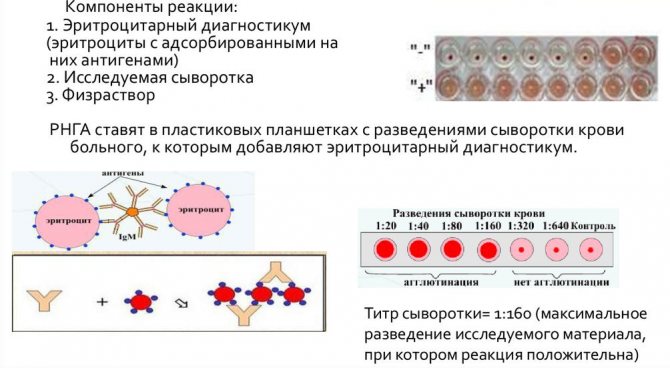
RSK
The difference between RSC is as follows. To search for antibodies in the blood serum under study to a particular antigen, a diagnostic kit is used that contains not only sheep red blood cells, but also free complement. Complement is a protein complex that can activate a membrane attack component. Red blood cells are sensitized by their own antibodies to them, so there are two ways of development of events. The first is that if antibodies, for example, to the causative agent of whooping cough circulate in the patient’s blood, then the complement system will be aimed at eliminating these newly formed antigen-antibody complexes, and the sheep’s red blood cells will remain intact. Hemolysis of the sheep's red blood cells will not occur - the diagnosticum will remain transparent, with a small sediment at the bottom of the sheep's red blood cells. RSC is positive (no hemolysis).
And the second way is that there are no antibodies to whooping cough in the patient’s blood, then the complement system will have to bind the “antigen-antibody” complex on the sheep’s red blood cells. In this case, there will be hemolysis of the sheep's red blood cells; visually it looks like transparent, homogeneous red-orange lacquered blood. RSC is negative (there is hemolysis).
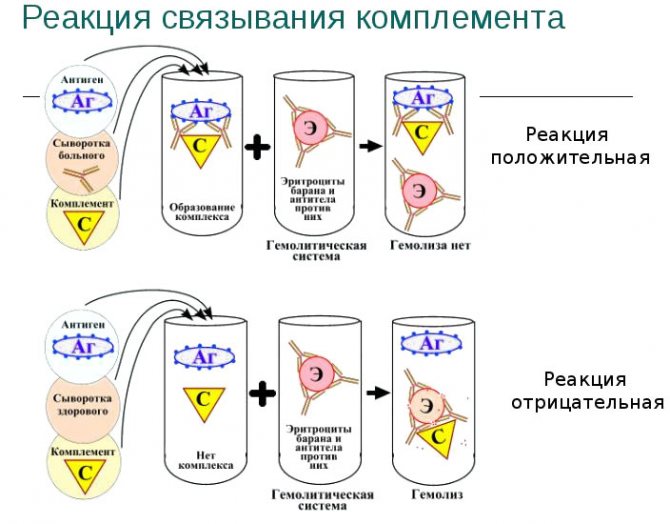
ELISA
To carry out ELISA, the same diagnostic tests are used, but labeled with enzymes (alkaline phosphatase, peroxidase, etc.). Thus, a reaction is formed to positive antigen-antibody complexes, the result of which can be easily visually assessed using specific test systems. The advantage of ELISA is that the result is ready within a few days, or even hours - it is an express diagnosis (more often used in the express diagnosis of HIV infection).
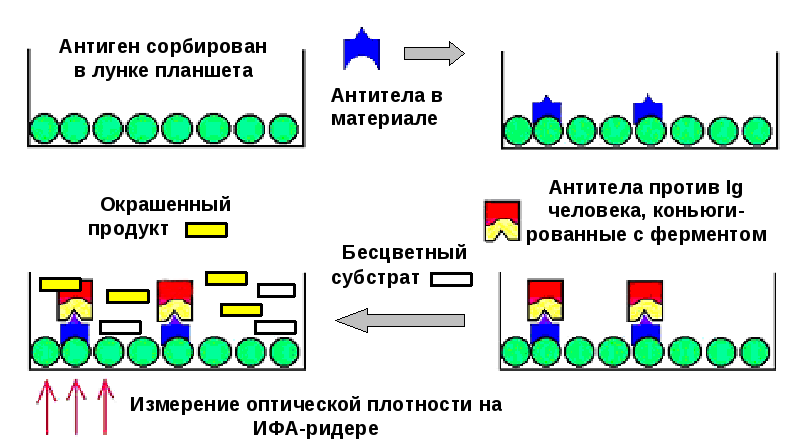
REEF
RIF differs from previous methods in that in the latter case, antibodies to certain pathogens are labeled with fluorescent substances. When examining patient tissue samples treated with labeled antibodies, the resulting “antigen-antibody” complexes glow in a fluorescent microscope, which means the reaction is positive.
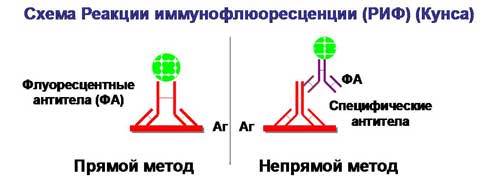
Why are serological tests needed?
Blood serology is performed if the doctor needs to obtain reliable information about the presence of antibodies to certain infectious agents in the patient’s blood; identify whether the disease is acute or has already been suffered previously; and also evaluate the effectiveness of the treatment.
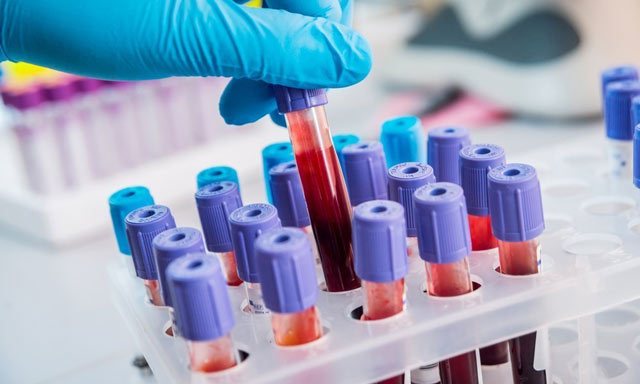
Group 1 of indications for serological blood tests is the determination of antigens or antibodies in the blood to the following diseases:
- viral diseases (influenza, hepatitis A, B, C, D, HIV infection, chickenpox, measles, rubella, mumps, infectious mononucleosis (Ebstein-Barr virus), cytomegalovirus infection, human papillomavirus, herpes simplex virus and many others ),
- bacterial diseases (tuberculosis, syphilis, brucellosis),
- diseases caused by protozoa (rickettsiosis, chlamydia, amebiasis, giardiasis, etc.),
- diseases caused by fungi (aspergillosis),
- parasitosis (opisthorchiasis, ascariasis, toxocariasis).
Group 2 of indications is the determination of the type of antibodies to a particular pathogen . During any infectious process, human immunocompetent organs produce different types of antibodies - these are immunoglobulins of the IgG, IgM and IgE classes.
IgM are produced in the first 5-7 days and indicate the presence of an acute infectious process in the body.
IgG is produced in 7-14 days and persists for life. Thus, the determination of IgG in the blood, for example, to chickenpox or rubella, indicates that the patient has been ill or has been vaccinated, thus maintaining stable lifelong immunity to this disease.

Table: types of antibodies
Group 3 indications – differential diagnosis between a current acute infection and infections suffered in the past. To do this, the determination of the increase in antibody titer in the blood is used. If, during a repeat study, the titer turns out to be higher than in the previous study, this means that the infection is acute, because with a previous infection, the antibody titer will remain the same, without changes.
Preparing for analysis
In order to properly prepare for blood collection for serological tests, it is enough to follow the usual rules before donating blood.
It is necessary to avoid a heavy dinner at night; only a light snack is allowed. This condition must be met to avoid chylosis, or increased lipid content in the serum under study. Many tests for chylous blood cannot be performed for technical reasons.
On the eve of the study, you should limit smoking and completely eliminate alcohol. It is not necessary to eliminate previously habitual physical activity.
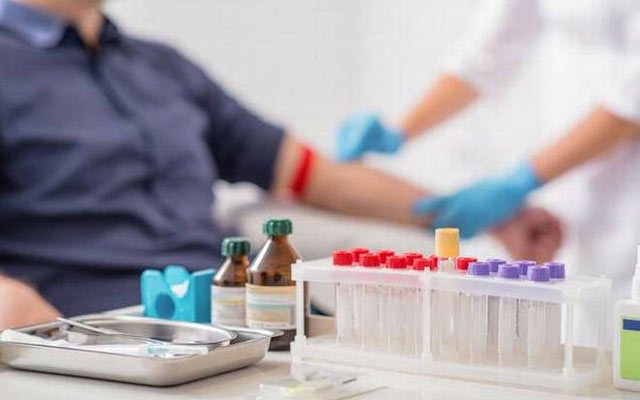
In the morning, you should come to the treatment room strictly on an empty stomach; you are only allowed to drink a glass of water.
Blood is drawn in a laboratory or treatment room. By puncturing the flexure of the ulnar vein, the nurse draws venous blood into a vacuum tube (or syringe). The labeled tube is delivered to a virological or bacteriological laboratory, where the study is carried out. The result is usually ready in 5-7 business days.
How to prepare for a serological blood test?
Since serological analysis requires venous blood sampling, preparation for its delivery follows the classic recommendations for blood sampling. For correct serological analysis, you must adhere to the following rules:
- You should refrain from drinking alcohol 2-3 days before the procedure.
- Avoid physical and emotional stress on the day of blood collection
- The test should be taken before taking medications.
- Blood is taken on an empty stomach and usually early in the morning, so the patient needs to fast 8-12 hours before the procedure. A light dinner is allowed the night before.
- Eliminate fatty and spicy foods from your diet
- For 8-10 hours, do not drink strong carbonated drinks, energy drinks, coffee and tea.
Sign up for a serological test
Make an appointment
Interpretation of results and deviations from the norm
Any of the serological blood test techniques can be interpreted as positive, negative, false positive or false negative. False results are quite rare and are usually the result of technical errors during transportation or analysis.
A positive result indicates the presence of immunity in the body (if antibodies to the pathogen are determined) or the presence of infection in the body. Here it is necessary to take into account the specificity of the antibodies found, because only the type of immunoglobulins detected (IgM or IgG) indicates the stage of the process - the acute phase or traces of a previous infection (or vaccination), respectively.
A negative test result in the case of detection of both antibodies and antigens indicates that there is no infection in the body, but there is also no immunity to this pathogen. Sometimes this is not a very good result, for example, in the case of examining an adult patient for childhood diseases (measles, rubella, chickenpox), a negative result indicates that the patient has never been sick and is capable of getting sick easily, which is fraught with its own complications in adulthood. But for other infections, such as syphilis, hepatitis, HIV infection and many others, of course, a negative result means that the person is healthy.
Serological blood tests are performed free of charge in any clinic or hospital, but for clear indications. For example, if a patient is suspected of having any of the diseases listed above, the doctor must issue a referral for testing. But if the patient wants to be examined on his own, he can go to any private laboratory and donate blood for all the infections he needs. The price for research in different laboratories varies, depending on the type of pathogen to which antibodies are determined, and ranges from 500 rubles.
Serological analysis in "Family Doctor"
Serological blood test is a basic test in gynecology and urology. Used for the diagnosis of ToRCH infections and sexually transmitted diseases, primarily HIV, syphilis (RW test), herpes, cytomegalovirus, chlamydia, toxoplasmosis, rubella, and other diseases.
In other branches of medicine, serological analysis is used to detect viral hepatitis (B and C), measles, mumps, as well as the causes of myocarditis, Legionnaires' disease, atypical pneumonia, and intestinal infections.
Serological testing is also used to diagnose autoimmune diseases. In this case, antibodies are produced to the tissues of the body itself and the study allows them to be detected.

